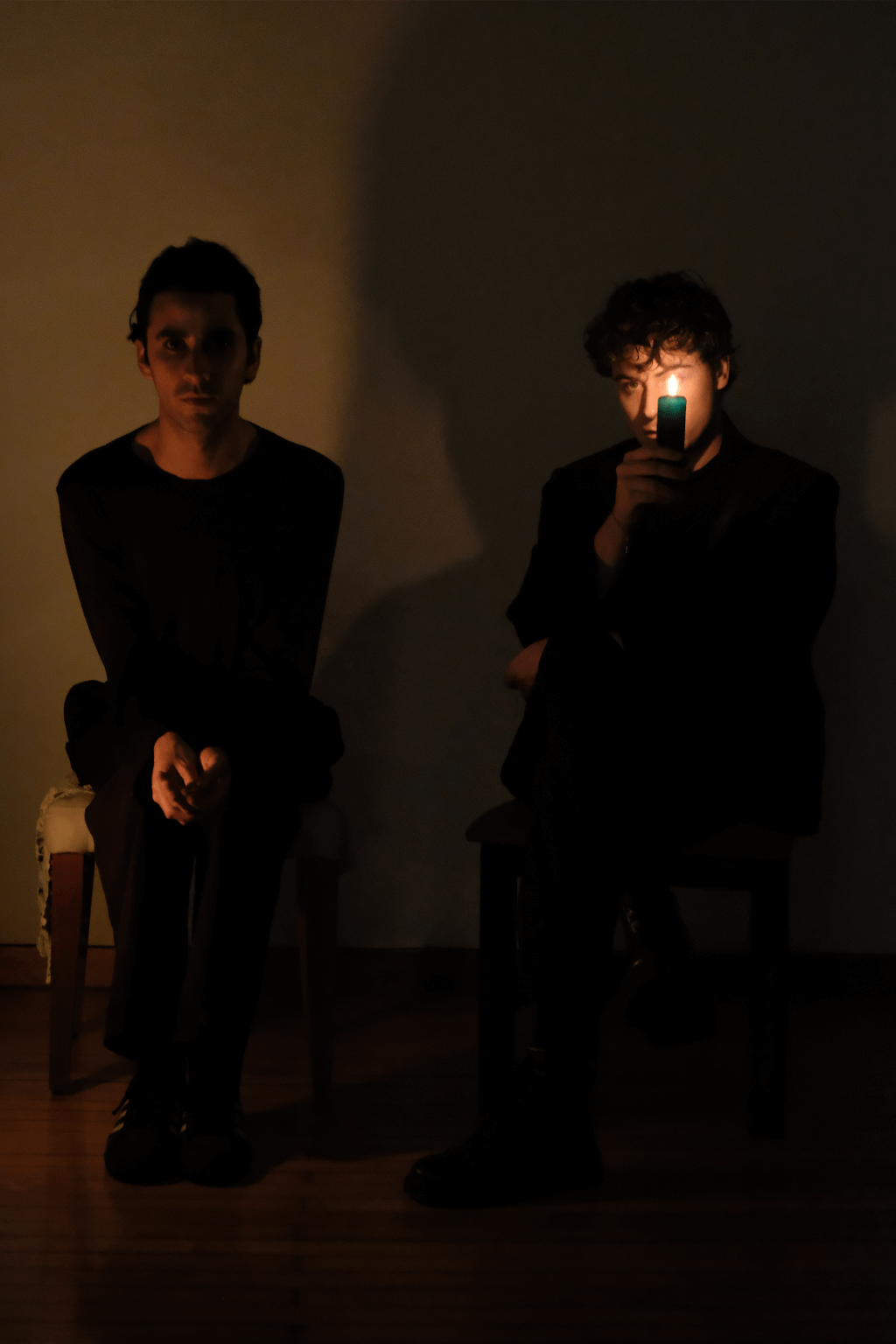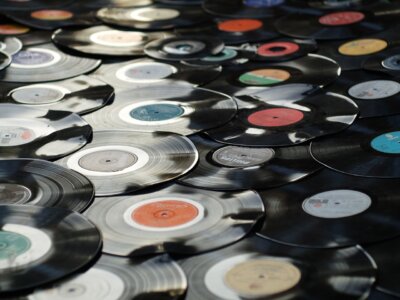Ángel De La Guarda Sculpt the Ethereal

The city of Santiago, Chile has produced an eclectic array of musical artists in recent years. Angel de la Guarda might be considered forerunners in this wave with their sophomore release Alfanumérico. An echoing dronescape borne out of occultism & “unalterable” factions of reality – this release sees new levels of sonic adventure when considering their post-punk tinged debut Sentencia. Northern Transmissions caught up with the duo, Santiago González & Pedro Roca to chat the creative community in Chile, modified gear and tapping into the unconscious mind.
Northern Transmissions: How did you meet and come together to form Ángel De La Guarda?
Santiago González: Pedro and I met in the first year of film school. I stayed a couple of months and left, I didn't find myself so much in that formal and academic artistic approach. I remember that in those few months we became very close, even though we didn't have so many classes together, we always saw each other to talk about music. We were both being drawn to an energy inspired by playing as loud and long as possible. We usually got together once a week to play bass and guitar for hours on top of a drone and a drum machine. That's how it all started. From the trance state generated by the psychophysical detachment of playing music. We grew up listening to bands like Velvet Underground, Follakzoid, Sunn O))), Jesus & The Mary Chain, Spiritualized, Suicide. They all have that something in common. Whether it's detachment, loss of control, that physical sensory opening influenced by intensity. All in different ways but similar in the end. That was the approach that ended up naturally defining us to make Ángel De La Guarda.
NT: What are some of your early musical memories from childhood? When did you begin playing music?
Pedro Rocca: My first memories of playing music were in my childhood, while I was going through a difficult time in my family. I remember having to cover my head with something and the noise made me feel present in the place where I was without thinking about the future or the past. I remember entire afternoons playing a white Stratocaster trying to saturate and play as loud as possible. My most precise memory was one afternoon, coming back from school I started playing my guitar and I couldn't get the intensity I needed, I tried turning up my amp and effects to the maximum but still the energy I needed was not enough, so I went to the electrical current and flipped the switches up and down to create an overdrive effect to get a sound out of my amp that I had never been able to achieve with a pick and strings in order to get the level of power I needed. At that moment I understood that my approach to music was not in technique but in the intensity of sound, and that has not changed to this day.
SG: In my case, one of my oldest memories is around 3 years old in my mother's car listening to "Alone Again" by Gilbert O'Sullivan. I remember it as the first time I was moved by sound. My mother listened to a lot of American folk, the most heartbreaking kind too. From Bob Dylan, Joan Báez, Don Mclean to Leonard Cohen, among other classics, also mixed with a lot of psychedelic rock from the 60s, especially
The Doors. On the other hand, my dad listened to a lot of music with synthesizers. An album in particular would be “Oxygèn” by Jean-Michel Jarre, that would be my first memory of something that caught my attention, from that idea of not knowing what it is or how it is made. In addition, all this is involved in something that is quite significant to me, which would be the fact that the only way to access that music was through traveling by car with them, so it was something quite introspective due to movement and silence.
Later, when I was 12 years old, my older brother taught me to play the electric guitar, or rather he encouraged me to make noise with it more than teaching me chords or how to really do it. He already came from a rebellious musical background defined in punk and metal so he was basically a crucial influence in leading me towards an adolescence where I could find myself experimenting with my own identity rather than following something imposed by that conditioning of “being part of something”. I always felt very detached from that and it is something that I am very grateful for.
NT: How would you describe the music community in Santiago?
SG: I personally feel that nothing interesting or relevant has happened in the last 6-7 years in Santiago. Many fleeting and pretentious things with a lot of encouragement to instantly achieve that imaginary of success that social media sells you. Being such a small city, this classic phenomenon of artistic hypocrisy occurs. Where everyone “loves” and hates each other simultaneously causing nothing genuine to emerge. Being stuck in that loop is a very dangerous thing, especially if you are living a political moment like the one that is happening in Chile. All that anger has to go hand in hand with building a community, I think it's key to destroy that self-centered, narcissistic mindset in order to actually do something about
it. That’s why something that has me very excited is that in recent months there have been appearingBmore artists, collectives and spaces for experimental music.
Little by little, a scene is taking shape of people who choose to feel something, to listen, and not only in Santiago but also in regions, especially Valparaíso and Concepción, and that is something that is urgently needed at this time. Some Chilean artists that I recommend you see and listen to if you have the opportunity are Camila Cijka, Bajo Riesgo, Valentina Villaroel, Pobre Diabla and Subcompacto.
NT: Did you have a different approach with songwriting for your first release, Sentencia versus the new album Alfanumérico? There seems to be a shift on Alfanumérico into industrial trance territory and more experimental structures.
SG: Absolutely, I wrote and produced "Sentencia" in two weeks. At that time we lived together in an apartment in Santiago. It was all much more raw and instant. The process was super spontaneous, basically everything started with a bass line from the Moog accompanied by a drum pattern from the Roland 707. On top of that I tried some guitars and if it worked I called Pedro who was in his room to come and record them.
It was a much more classical approach in terms of sound unlike “Alfanumerico” which took me 8 months to compose and was a much more experimental process of deconstruction and unlearning. I found myself very obsessed with the idea of connecting psychoacoustic phenomena, occultism and
esotericism. The entire record is on a specific note and frequency that gradually changes over the course of time. The rhythmic patterns were created through different geometric shapes based on regularBconvex polyhedra. In each song there is a drone at a frequency that refers to some aspect of human nature, whether on a neural or physical level. We also worked together with the Chilean artist Macarena Cuevas to make a metal plate that replace the plastic pickguard of Pedro's guitar and thus be able to generate more electrical charge and resonance. It was really a drastic change in terms of altering the sound perception of the guitar.
Something that was also quite revealing was entering the process of writing lyrics from the unconscious. For this, I developed a method that consisted of falling asleep thinking about one of the 7 concepts on the album (Time, Space, Reflection, Gravity, Electricity, Magnetism and Light) and setting 3 alarms to wake me up at 5, 6 and 7 in the morning. Once one of the alarms went off, I had about 10 seconds to take a notebook that was on my bed and write while I was in that state between wakefulness and sleep.
I wrote about 30 pages of words, phrases, sentences and it took me about 3 months to fit each one of them to make the lyrics of the album. That record was certainly a very rigorous search in terms of finding our sound through destruction as a medium. A laboratory work where we give ourselves to the service of what originally prompted us to make music in the beginning.
NT: I love the conceptual unity of addressing fields of energy and functions of reality (time, reflection, ect.). What do you hope is communicated from the themes in this release?
SG: The idea of the 7 concepts is born from the unalterable. From the origin of the indispensable in our present. We function as an interface that channels information from a place that is beyond our control. From there comes the idea of materializing the entire album from that place. Without overthinking anything, just receiving and accepting the information that is revealed over time.
NT: Is there a piece of gear you feel best personifies the direction of Alfanumérico?
SG: For me it is the beast of SOMA's Lyra-8, my favorite synthesizer. There are few electronic instruments where you can feel absolutely connected with being an extension of it. The level of response in terms of layers, textures, resonance and power is gigantic. When intuition is balanced with electronics, that's when that experience of detachment happens the most. That's what I'm aiming for musically from my perspective.
PR: The modified guitar is a piece of gear that personifies the album, mostly in the electrifying feeling and the harsh sound that the aluminum of the pickguard generates. This saturated sound produced by the guitar was part of the process of being carried away by electricity. In my experience, this process was the key to achieve the sound of the guitar on the record. When I play the album live, I feel like I am just guiding the noise and waves emanating from the amplifier, and the capacity of the guitar to push out all of the saturation outcomes directly from the aluminum. The final addition to the guitar was a metal tool, to achieve precise sustain and producing a continuous sound for live performances. For me, beyond being just an instrument, this piece of equipment has become an indispensable tool for Alfanumérico.
words by Linden Krause
Purchase Alfanumérico by Ángel De La Guarda HERE
Latest Reviews
Tracks
Advertisement
Looking for something new to listen to?
Sign up to our all-new newsletter for top-notch reviews, news, videos and playlists.





